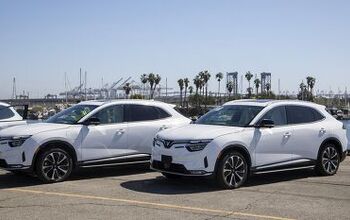Report: Volkswagen to Sell Stake in Electrify America

According to a report in Automotive News, Volkswagen Auto Group is about to sell its stake in Electrify America, a company that builds chargers for electric vehicles.
The company wants to do this so that it can seek outside funding to build its own charging infrastructure.
According to the News, VW is working with Citi to find a co-investor that would be willing and able to pump $1 billion into building charging infrastructure.
Electrify America, a rival to Tesla’s Supercharger network and ChargePoint, came into the picture after VW’s diesel-emissions scandal and has been expected to spend $2 billion on the expansion of a charging network for EVs from 2017 to 2026. So far the company has 635 stations active and 125 planned.
As recently as March, Electrify America and VW made mention of plans for further expansion. Now, VW is trying to consolidate its infrastructure efforts.
The segment is attracting attention from all sorts of companies as the EV future looms larger and larger.
Renault and Shell, for example, are rumored to have an interest in becoming co-owners of Ionity, a European joint venture for charging that is already owned by OEMs such as BMW, Daimler, Ford, Hyundai, and VW.
It makes sense to see OEMs investing in charging companies and attempting to increase infrastructure to support the EVs they plan on selling. The bigger question is why VW is possibly moving away from one company and seeking out another.
Regardless, expect to see more corporate musical chairs over the next few years.
[Image: Volkswagen]

Tim Healey grew up around the auto-parts business and has always had a love for cars — his parents joke his first word was “‘Vette”. Despite this, he wanted to pursue a career in sports writing but he ended up falling semi-accidentally into the automotive-journalism industry, first at Consumer Guide Automotive and later at Web2Carz.com. He also worked as an industry analyst at Mintel Group and freelanced for About.com, CarFax, Vehix.com, High Gear Media, Torque News, FutureCar.com, Cars.com, among others, and of course Vertical Scope sites such as AutoGuide.com, Off-Road.com, and HybridCars.com. He’s an urbanite and as such, doesn’t need a daily driver, but if he had one, it would be compact, sporty, and have a manual transmission.
More by Tim Healey


































Comments
Join the conversation
I still don't understand the problem these companies are trying to solve
I don't understand why VW would back out of EA, and I'm confused because I thought EA was their baby to begin with. One area where Tesla quality is head and shoulders above everyone else is the Supercharger network. Nearly all of their stations earn a 10/10 rating, but other brands are designed by committee and it shows in their spotty ratings.
@ToolGuy, Scoutdude: You both make good points about the business model. There is a perverse irony at play: 1. In the new beginning (~2011), EVs had short range and no meaningful charging network - just when they needed it most. 2. Today, with long-range EVs, charging networks are almost plentiful (not necessarily reliable...), but a long-range EV is still used primarily for daily driving and is charged at home. So making a profit on a charging network may become increasingly difficult to do. An analogy would be: imagine trying to make a profit by adding double the number of gas stations in a region.
It looks like Tesla might be opening it's network up to other companies. That could be the reason.